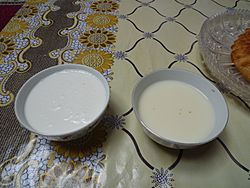Chal facts for kids

Bowls of shubat (left), beverage of fermented camel milk, and kumis (right), beverage made from fermented mare's milk
|
|
| Alternative names | Shubat |
|---|---|
| Place of origin | Turkmenistan, Uzbekistan and Kazakhstan |
| Main ingredients | Camel milk |
Chal, also called shubat, is a special fizzy white drink. It is made from fermented camel milk. This sour drink is very popular in Central Asia. You'll find it especially in countries like Kazakhstan, Uzbekistan, and Turkmenistan.
In Kazakhstan, people call this drink shubat. It's a favorite summer food there. Chal is hard to send to other countries. This is because of how it's made and how quickly it can spoil. Sometimes, a creamy layer called agaran forms on top of chal. People collect this layer.
What is Chal?
Chal is a traditional drink, especially for Turkic peoples. It's known for its unique sour taste and sparkling look. Many people believe that fermented chal has special health benefits. They think it might help fight off viruses. This is a quality not found in fresh camel or cow milk.
How is Chal Made?
Making chal usually starts by souring camel milk. This is done in a special skin bag or a ceramic jar. A small amount of already soured milk is added first. This helps the new milk to ferment.
For about 3 to 4 days, fresh camel milk is slowly mixed in. When the chal is ready, about one-third to one-fifth of it will be the older, soured milk.
Camel milk takes longer to sour than cow's milk. If the temperature is below 10°C (50°F), it won't sour for up to 72 hours. At warmer temperatures, like 30°C (86°F), the milk will sour in about 8 hours. Cow's milk, for example, sours much faster, in about 3 hours.
Chal contains helpful bacteria like Lactobacilli and streptococci. It also has yeast. These are important for the fermentation process.
 | Aurelia Browder |
 | Nannie Helen Burroughs |
 | Michelle Alexander |

